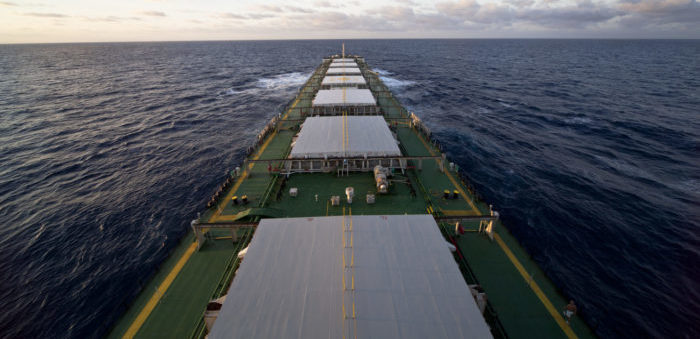Around 90 % of the world trade is handled by the international shipping industry. Meaning that our industry is an integrated part of the global economy. But, which comes first? Profit, society or environment? It is critical to meet both the increasing environmental and social challenge with the right mindset and resources.
What sustainable development means for the shipping industry
The United Nations (UN) Sustainable Development Goals (SDGs) of the 2030 Agenda for Sustainable Development were adopted by world leaders in September 2015 at a historic UN Summit. They came into force on 1 January 2016 and are a universal call to action to end poverty, protect the planet and ensure that all people enjoy peace as well as prosperity. Among the 17 interconnected Goals and related Targets, there are six major ones that shipping industry has had the most impact:
- UN SDG 6: Ensure availability and sustainable management of water and sanitation for all
- UN SDG 7: Ensure access to affordable, reliable, sustainable and modern energy for all
- UN SDG 8: Promote sustained, inclusive and sustainable economic growth, full and productive employment and decent work for all
- UN SDG 9: Build resilient infrastructure, promote inclusive and sustainable industrialization and foster innovation
- UN SDG 13: Take urgent action to combat climate change and its impacts
- UN SDG 14: Conserve and sustainably use the oceans, seas and marine resources for sustainable development
Sustainable development is development that meets the needs of the present without compromising the ability of future generations to meet their own needs
(Brundtland Commission Report, 1987)
Sustainability mega-trends that are catalysts for the future of shipping
- Human population and world economy growth:
Sometimes there is a conflict between population growth and sustainable development. An expansion in numbers [of people] can increase the pressure on resources and slow the rise in living standards. At the other end of the as long as population grows, there will be more labor resources, new technologies and increased trade.
- Regulatory landscape:
Merchant shipping is one of the most heavily regulated industries. Most of the regulations concerning shipping are developed at the global level for the industry to operate cleaner and be more transparent: Ballast water management, the Sulphur 2020 cap and EU-monitoring, GHG Emissions Reduction Strategy etc.
- Fourth industrial revolution:
The Fourth Industrial Revolution (4IR) offers huge potential to transform and realign our economies and societies. There is an increasing realization that the 4IR could also exacerbate problems for planet, achieving sustainable growth and contribute toward the UN SDGs.
- Gender equality:
The push for policies to improve gender equality at the global level is getting new impetus through the Sustainable Development Goals. Shipping industry is pushing for gender equality aiming to overtake the difficult conditions which navigate the male-dominated maritime industry.
Five key challenges towards sustainable shipping
- Operational performance and improvement through digitization
Technology is going to shape a new sustainable shipping, not only by transforming the future of business, but also the nature of work. Digitization brings transparency and enhances accountability of a shipping organisation’s workforce. It enables new routes to shipping market and faster development ultimately transforming operational processes and business models. This process at the end helps in improving organizational performance.
- Data protection and cyber safety
Ships are increasingly using systems that rely on digitization, integration, and automation. Implementing effective cybersecurity measures is particularly challenging today because there are more devices than people, and attackers are becoming more innovative. As a result, security of data and other sensitive information has become a major concern of maritime.
New regulations update current legislation as a result of digitalization and technological developments. They aim to protect individuals from unauthorized use of their personal information from organizations and to be easy for data controllers around the world to follow. Shipping in the years to come is going to be more transparent, humane and personalized with respect to targeting; organizations are going to treat partners like humans, not like numbers.
- GHG reduction strategy implementation
Even though shipping is the most eco friendly form of transportation, it does still account for a large amount of the greenhouse gas emissions(GHG). The MEPC72 adopted an initial strategy on the reduction of the GHG emissions from ships, setting out a vision to reduce GHG emissions from international shipping by a min of 50% within the next 30 years. We need global action with respect to GHG emissions, but we need it on time. There is a sense of urgency in order for the shipping sector to contribute to the Paris Agreement to keep the increase of global temperature well below two degrees. We have a long way to go as an industry. But at the same time, there are many options available to reduce air pollution from ships.
- Attracting and retaining quality staff
Shipping organizations must examine what type of people will be required to work for them in order to ensure a sustainable shipping model. Gender equality, new mindsets, skill sets, and leadership should be taken into account from now onwards. Without factual knowledge and management skills, leaders cannot convince their people that they are on top of the maritime issues and take it seriously themselves. Let’s bear in mind that happier staff members also tend to perform better, circumventing the expensive process of firing and rehiring.
- Sustainable profit models for all stakeholders
Sustainability is not only about Corporate Social Responsibility and environmental protection but also about profit. Organizations need to generate sustainable business results in order to be commercially successful and valuable for their existing and potential charterers, vendors, business partners and stakeholders.
Call for Action
Undoubtedly, it is of essence to create systemic change in the shipping industry. Organizations with a first class, sustainable first reputation, now attract a lot of attention. In addition to saving the planet, sustainable practices lead to a continued industry growth for all stakeholders over the long run.
In order to react to the social, environmental and economic challenged shipping needs to:
- Build resilience
- Think green and be proactive
- Welcome gender equality in maritime
- Adopt a more convergent attitude, bridging the gaps
- Leverage new technologies and cyber security
- Improve efficiency and optimization
About Apostolos Belokas
 Apostolos is a Maritime Safety, Quality & Environmental Expert, Consultant, Trainer and Project Manager with more than a 20-year background in shipping as Technical, Marine, Safety & Training Superintendent and Consultant. He entered the industry back in early 90’s as Engineering Superintendent with a leading ship manager operating a mixed fleet of bulk and oil/chemical tankers. He then shifted to regulatory compliance and QHSE as superintendent and later as a Consultant and Trainer. Apostolos has successfully completed a wide range of QHSE projects including 250+ management system projects (ISM/ISO 9001-14001-18001/TMSA/MLC), 500 vessel and office audits to various standards and he has trained more than 8,000 people in a wide variety of QHSE subjects. He has also presented and chaired to more than 40 conferences. He holds Mechanical Engineering Bachelor and Master’s specialising in Energy & Environment and Master’s Degree in Maritime Business and Business Administration (MBA), all of them awarded with distinction. Apostolos is the Managing Director of SQE MARINE, SQE ACADEMY and Managing Editor of SAFETY4SEA.
Apostolos is a Maritime Safety, Quality & Environmental Expert, Consultant, Trainer and Project Manager with more than a 20-year background in shipping as Technical, Marine, Safety & Training Superintendent and Consultant. He entered the industry back in early 90’s as Engineering Superintendent with a leading ship manager operating a mixed fleet of bulk and oil/chemical tankers. He then shifted to regulatory compliance and QHSE as superintendent and later as a Consultant and Trainer. Apostolos has successfully completed a wide range of QHSE projects including 250+ management system projects (ISM/ISO 9001-14001-18001/TMSA/MLC), 500 vessel and office audits to various standards and he has trained more than 8,000 people in a wide variety of QHSE subjects. He has also presented and chaired to more than 40 conferences. He holds Mechanical Engineering Bachelor and Master’s specialising in Energy & Environment and Master’s Degree in Maritime Business and Business Administration (MBA), all of them awarded with distinction. Apostolos is the Managing Director of SQE MARINE, SQE ACADEMY and Managing Editor of SAFETY4SEA.




































































